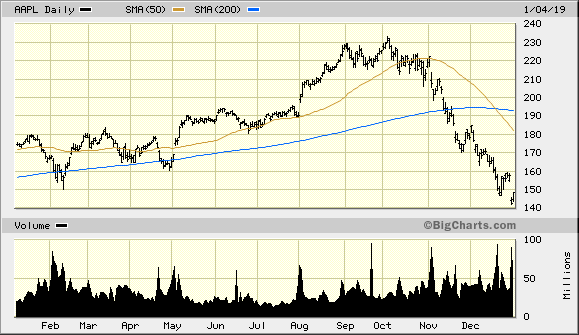The Everything Bubble And The Second Great Depression
The importance of Apple to the foundation of the everything bubble cannot be overstated – Kevin Duffy, Co-Founder, Bearing Asset Management
The last few months have witnessed the return of volatility. The S&P is down 14% from its all time highs a few months ago and the Nasdaq 17%. However, this masks much of the carnage underneath and is only the precursor of what is to come in my opinion.
Apple (AAPL) is the most important stock in the market so when it preannounced a revenue miss last Wednesday afternoon investors took notice. Apple reduced its 4Q18 revenue guidance to $84 billion from a midpoint of $91 billion given just two months ago. Crucially, it attributed 100% of this miss to a slowdown in China. This is important because it is “macro”, having implications for every company that does business in China. AAPL is now down almost 40% from all time highs reached just a few months ago.
AAPL is not the only economic bellwether to guide down in recent weeks. On December 18, Federal Express (FDX) reduced the midpoint of its Non-GAAP EPS guidance by 8% citing a slowdown in global trade: “Global trade has slowed in recent months and leading indicators point to ongoing deceleration near term” – Alan Graf, CFO. FDX is down 40% from all time highs reached just a few months ago.
One of the best stocks in the market the last few years has been Nvidia (NVDA). They have reported phenomenal revenue growth quarter after quarter, including 41% growth for the year ended Jan 28, 2018. However, on November 15, they forecast 4Q18 revenue of $2.7 billion – a year over year decline from last year’s $2.9 billion. When hot growth stocks stop growing the bottom can fall out and that’s exactly what has happened with NVDA, which is down more than 50% from all time highs just a few months ago.
We have involved ourselves in a colossal muddle, having blundered in the control of a delicate machine, the working of which we do not understand – John Maynard Keynes
While the wealthy have profited from an incredible “Everything Bubble” in financial assets over the last decade, the middle class has hollowed out and many are now working in the “Gig Economy”. The Gig Economy consists of workers who work as independent contractors rather than employees. Crucially, these workers do not receive healthcare and retirement benefits. In addition, they have to grind for every dollar they make. Think of drivers for Uber and DoorDash. Much of the rest of the population works in service jobs that cater to the wealthy, like restaurants, retail, etc…
This “Everything Bubble”, driven by the Fed’s unprecedented 0% federal funds rate and Quantitative Easing, is now coming to an end in my opinion. On December 19, the Fed hiked the funds rate for the 9th time to 2.25%-2.50%. They also initiated Quantitative Tightening in October 2017, allowing maturing securities to run off their balance sheet at a rate that has now reached $50 bil/month.
On Friday, Fed Chairman Jerome Powell said that the Fed is not on a preset course, suggesting they could stop tightening or even loosen policy, resulting in a massive stock market rally. However, the Fed is in a very tough spot. Having inflated an asset bubble that they have only just recently started to address, they face the dilemma of igniting an even more massive bubble or continuing along the prudent course of restoring sanity to our financial markets and economy. Even if they opt for the former, they will most likely act too late if history is any precedent.
My personal conviction is that we will see a massive stock market unwinding of 2/3 to 3/4 from peak to trough in the major indexes over the next two to five years. That implies a bottoming of 750-1000 on the S&P 500.
With the hollowing out of good middle class jobs and the division of most of the population into the Top 10% and the Gig/Service economy, an unwinding of the Everything Bubble will decimate the economy. The wealthy will see their assets massively diminished and this will decrease their spending on services from the Gig/Service economy. The wealthy will get by, as they always do, but many in the Gig/Service economy will find themselves struggling more or even jobless. We may very well be on the precipice of a Second Great Depression.
Greg Feirman
Founder & CEO
Top Gun Financial (www.topgunfp.com)
A Registered Investment Advisor
(916) 224-0113


